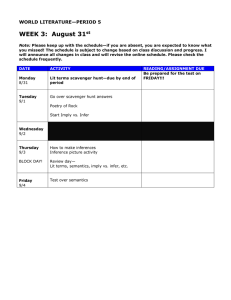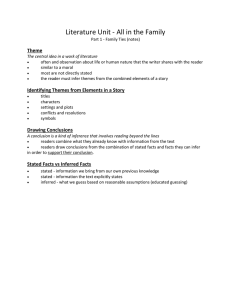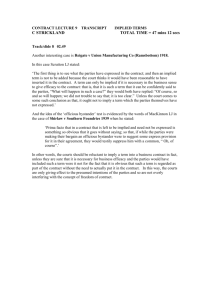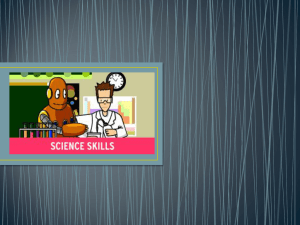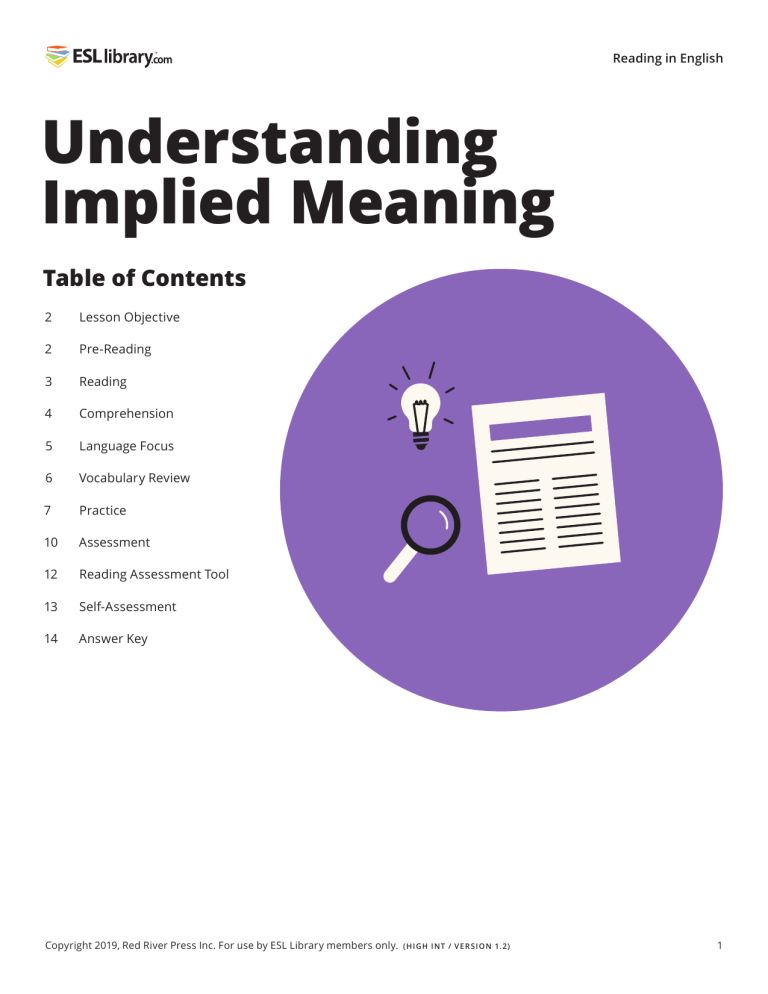
Reading in English Understanding Implied Meaning Table of Contents 2 Lesson Objective 2 Pre-Reading 3 Reading 4 Comprehension 5 Language Focus 6 Vocabulary Review 7 Practice 10 Assessment 12 Reading Assessment Tool 13 Self-Assessment 14 Answer Key Copyright 2019, Red River Press Inc. For use by ESL Library members only. ( H I G H I N T / V E R S I O N 1. 2) 1 Understanding Implied Meaning Reading in English Lesson Objective In this lesson, you’ll learn to read and understand information that is communicated indirectly by an author. You will also learn the difference between the verbs imply and infer. First, let’s think about how we hint at meaning through our gestures and actions. Pre-Reading A. Take a Guess Read and discuss each gesture or action with a partner. Take a guess about what each one means. • a mom looks at her watch three times as her child arrives home from school • a neighbor comes over to your home for coffee and zips up her sweater • a friend hands you a box of tissues as you begin to watch a movie • a spouse gets up from the dinner table and brings back the salt shaker B. Vocabulary Preview Match up as many words and meanings as you can. Check this exercise again after seeing the words in context on page 3. 1. literal a) to communicate 2. implied b) to use 3. explicitly c) in the most basic sense 4. implicitly d) an understanding or conclusion based on evidence 5. convey e) in a clear, detailed way 6. utilize f) information or understanding one already has 7. prior knowledge g) in an indirect way 8. unfamiliar h) suggested indirectly 9. decipher i) to figure out, to understand 10. inference j) not known, not well understood Copyright 2019, Red River Press Inc. For use by ESL Library members only. ( H I G H I N T / V E R S I O N 1. 2) 2 Understanding Implied Meaning Reading in English Reading 1. In written English, just as in spoken English, meaning can be literal or implied. When a word or passage has a literal meaning, it is stated directly. The writer or speaker spells out exactly what he or she means. However, writers often expect more advanced readers to do a bit more work. This is especially true with fiction. 2. Writers often use the “show, don’t tell” technique to make their writing more meaningful. Instead of explicitly describing a character or setting, fiction writers use actions or emotions to convey meaning implicitly. A writer could easily use the words “cold and snowy” to tell a reader that her story begins on a wintry day. To show or imply that it is the first day of winter-like weather, however, the writer can describe a group of children struggling to find their boots and snowsuits. “Poetry had far better imply things than preach them directly...” ­—F. L. Lucas, literary critic 3. Dialogue can also be used to convey meaning about characters in an implicit way. For example, the mother in the scenario above may yell down to her kids: “Your boots and snowsuits are in the basement in a bin marked ‘Seasonal’!” When you read between the lines, you can infer that the children are old enough to read the word “seasonal,” but young enough to still wear snowsuits. 4. Readers can also utilize their prior knowledge to grasp the writer’s implied meaning. Readers draw conclusions about a character or situation based on their own world knowledge and personal experiences. Readers also rely on prior knowledge to infer the meaning of unfamiliar words. They look at nearby words that they recognize and try to decipher the meaning of the unfamiliar ones. 5. Unlike with detail and main idea questions, there is usually more than one possible answer to an inference question. Readers make educated or informed guesses based on inference clues from the writer. Being able to identify and explain how they made the inference is more important than getting the same answer as other readers. Copyright 2019, Red River Press Inc. For use by ESL Library members only. ( H I G H I N T / V E R S I O N 1. 2) Useful Inference Sentence Stems • • • • • • • My guess is... I think this means... Perhaps this means... It’s possible the author is trying to say that... Based on my own personal experience, I think that... I think the author is trying to convey that... The dialogue suggests that... 3 Understanding Implied Meaning Reading in English Comprehension Use the information from page 3 to answer the questions. 1. According to the reading, how is spoken English similar to written English? 2. What is paragraph 2 mainly about? 3. Why should readers pay close attention to dialogue in order to fully understand a story? 4. What can you infer about the mother in paragraph 3 based on what she says to her children? 5. How can readers infer the meaning of unfamiliar words? 6. How are inference questions different from main idea or detail questions? Copyright 2019, Red River Press Inc. For use by ESL Library members only. ( H I G H I N T / V E R S I O N 1. 2) 4 Understanding Implied Meaning Reading in English Language Focus A. Imply Vs. Infer The verbs “imply” and “infer” are often confused. To imply means to hint at something indirectly. A writer or speaker implies or hints at meaning without saying or writing it explicitly. To infer means to guess or figure out the meaning of something based on prior knowledge, experience, or other clues. A reader or listener infers the meaning. A trick for keeping these two words straight is to remember that “infer” is for the reader to “figure out.” • • What can you (the reader) infer (from the text)? What does the writer imply (by leaving hints)? B. Direct & Indirect Language Expressions Expression Definition Example spell something out t o say something in a very basic way so that people understand the meaning easily Do you need me to spell it out for you? Ella is not interested in dating you. read between the lines to figure out the full meaning of something even though it is not explicitly stated I understand that she’s not interested. I can read between the lines. draw conclusions to use the clues or information we have to make educated guesses Before you draw any conclusions, ask to hear her side of the story. take/can’t take a hint to detect (or to be unable to detect) implied meanings (often hinted at through actions, dialogue, tone) I stopped responding to his texts, but he can’t take a hint. Copyright 2019, Red River Press Inc. For use by ESL Library members only. ( H I G H I N T / V E R S I O N 1. 2) 5 Understanding Implied Meaning Reading in English Vocabulary Review A. Choose the Correct Word Choose the word or phrase with the closest meaning to the underlined word or phrase in the following sentences. 1. The writer implies that the characters are recently divorced. a) guesses b) hints c) states 2. Does the report explicitly state that the company is at risk of bankruptcy? a) uncharacteristically b) indirectly c) directly 3. I can’t decipher the instructions because your handwriting is so messy. a) deliver b) understand c) change 5. When I said he died, I didn’t mean that in the literal sense. He’s just really sad. a) basic b) reading c) death 4. He conveyed his disappointment by shaking his head at us. a) heightened b) communicated c) hid 6. My inferences were based on prior knowledge and personal experience. a) hints b) definitions c) educated guesses B. Complete the Sentence Complete the sentences using a form of imply or infer. 1. My colleague 2. The reader can that he is going to quit his job soon. that the main character is a young female. 3. From the speaker’s tone, we can 4. Are you 5. Make an that he is frustrated with the new regulations. that we should stop fighting for these changes? about the season based on the description in paragraph 2. Copyright 2019, Red River Press Inc. For use by ESL Library members only. ( H I G H I N T / V E R S I O N 1. 2) 6 Understanding Implied Meaning Reading in English Practice A. Unfamiliar Words Read the text and try to infer the word form and meaning of some unfamiliar words. Use your prior knowledge of nearby words to guess the part of speech and meaning. Complete the chart. # Word Ex fidget 1 aimlessly 2 splurge 3 amenities 4 monotony Word Form verb Allan Murdock fidgeted in his seat while he waited for his name to be called. First, he scrolled aimlessly through his social media updates. Then he pulled out his wallet and began to alphabetize his business cards. San Diego was the 12th city on Allan’s month‑long sales trip. He was physically exhausted and had splurged for his last night on the road. Allan was looking forward to an evening to relax and enjoy the amenities of this all-inclusive resort. Tomorrow morning he’d be flying home and returning to the monotony of his 9–5 workweek. Nearby Clues Definition in his seat, waited, scrolled, pulled out his wallet, alphabetize to play around with items nervously, to have difficulty sitting still Copyright 2019, Red River Press Inc. For use by ESL Library members only. ( H I G H I N T / V E R S I O N 1. 2) 7 Understanding Implied Meaning Reading in English Practice cont. B. Reading Between the Lines user-friends Work with a partner. Read the text and answer the questions together. Compare your answers with another group’s answers. 1. What does the writer imply about the time of year? What about the time of day? 2. What can you infer about Mrs. Washington? 3. What does the writer explicitly say about Brian? 4. What personal experience or knowledge can help you fully understand the first scene of this story? Outside 52 Hollyhock Lane, three orange jack-o’-lanterns grinned blindly on the front stoop. With their mouths opened wide, they were enjoying a windblown breakfast of freshly fallen snowflakes. Inside a different kind of storm was brewing. “I can’t find my boots!” Mark shouted. “There are no mittens!” Will said. “Where are the snowsuits buried?” their eldest sibling Brian said as he sifted through a mess of jackets and umbrellas. The children were going to be late for school, but that was the least of Mrs. Washington’s worries. “Check in the basement in the bin marked Seasonal!” she yelled down to them as she reached for a tissue to remove some of her red lipstick. “Hurry up! You’re all going to miss the bus.” Copyright 2019, Red River Press Inc. For use by ESL Library members only. ( H I G H I N T / V E R S I O N 1. 2) 8 Understanding Implied Meaning Reading in English Practice cont. C. Show, Don’t Tell Read the sentences and try rewriting them in a less explicit way. 1. My dog was very happy to see me when I got home from work. 2. I was born in a farmhouse on a cold, wet September morning. 3. Grandma Kate liked everything sweet, including cookies, cakes, and pies. 4. As I watched Franco drive away, I realized I was in love with him. 5. It was 6:00 am on a Sunday morning when the bad news arrived. Copyright 2019, Red River Press Inc. For use by ESL Library members only. ( H I G H I N T / V E R S I O N 1. 2) 9 Understanding Implied Meaning Reading in English Assessment A. Reading Read the text and answer the questions in Part B. Lillian stares down at her feet. Her new, furry slippers glare back. Did the right one wink at her? What Lillian had asked for was a sumptuous bathrobe like the kind from the hotels they used to stay at when his work paid for everything, including the mineral water. But things had changed. “Money doesn’t grow on trees anymore,” Robert had reminded her when she passed him her holiday wish list. “How about under trees?” Robert hadn’t laughed at this nor at anything Lillian had said in the last few weeks. He did chuckle when she opened his gift, though. “They’re for your icebergs,” he said. “Maybe both of us can get some shut-eye around here from now on.” Copyright 2019, Red River Press Inc. For use by ESL Library members only. ( H I G H I N T / V E R S I O N 1. 2) 10 Understanding Implied Meaning Reading in English Assessment cont. B. Comprehension Answer the questions based on the text in Part A. 1. Identify three unfamiliar words and make an educated guess about what they mean. 2. Do you have any prior knowledge or experience about hotels to bring to this text? 3. What does the author imply/infer about Robert’s job? (Circle the appropriate verb and answer the question.) 4. What can you imply/infer about the setting? (Circle the appropriate verb and answer the question.) 5. What does the author convey in the line “They’re for your icebergs”? 6. Why do you need to read between the lines to understand Lillian and Robert’s relationship? 7. Rewrite the last sentence in a more literal way. Copyright 2019, Red River Press Inc. For use by ESL Library members only. ( H I G H I N T / V E R S I O N 1. 2) 11 Understanding Implied Meaning Reading in English Reading Assessment Tool Name: Description of Task Skill Date Completed Score / Success Level Reading Success (check) Yes Assessment Criteria Almost Not Yet understands the difference between imply and infer uses prior knowledge and nearby words to infer meaning of unfamiliar words understands different ways that writers imply meaning makes inferences about characters makes inferences about setting Notes Copyright 2019, Red River Press Inc. For use by ESL Library members only. ( H I G H I N T / V E R S I O N 1. 2) 12 Understanding Implied Meaning Reading in English Self-Assessment MAKING INFERENCES Add check marks () to show what you've learned in this lesson. Name: Can I... Date: Yes (very well) Yes (with help) Not yet understand the difference between imply and infer? infer the meaning of an unfamiliar word from nearby words and prior knowledge? explain what it means to read between the lines? understand implied meaning based on what a character says? infer meaning about time and place? My Notes Copyright 2019, Red River Press Inc. For use by ESL Library members only. ( H I G H I N T / V E R S I O N 1. 2) 13 Understanding Implied Meaning Reading in English Answer Key LESSON DESCRIPTION: LEVEL: High Int In this lesson, students learn how to understand implied meaning TIME: 3+ hours TAGS: implied meaning, inference, making inferences, reading, in written texts. They learn the difference between the commonly confused words “imply” and “infer” and practice reading between reading strategies, imply, reading in English, fiction the lines. This lesson includes vocabulary review practice, comprehension, and assessment. Pre-Reading Comprehension A. TAKE A GUESS Have students work individually to answer the questions based on Have students work in pairs or small groups to discuss the implied meanings of the gestures and actions. Then discuss as a class. the reading. This task can be assigned for homework. 1. Answers will vary. According to the reading, spoken and written English are similar in that meaning can be literal (direct) or implied (indirect). B. VOCABULARY PREVIEW 2. 1. c 3. e 5. a 7. f 9. i 2. h 4. g 6. b 8. j 10. d Reading Paragraph 2 is mainly about “show, don’t tell,” a technique where writers use actions and emotions to imply meaning rather than stating information directly. 3. Writers should pay close attention to the dialogue to learn more about the characters. 4. You could infer that the mother is busy or distracted and expects her children to find their boots and snowsuits Have students read the instructional text individually or in pairs themselves. She might be an organized person since she has a or groups. Alternatively, you can read the text together as a class. Discuss the quote. labelled bin in storage for seasonal wear. 5. Readers can use prior knowledge or experience to infer meaning about unfamiliar words. 6. Inference questions are different from main idea or detail questions because there usually isn’t a wrong answer. It’s more important for readers to explain how they got the answer (show their evidence) than to answer it correctly. (continued on the next page...) Copyright 2019, Red River Press Inc. For use by ESL Library members only. ( H I G H I N T / V E R S I O N 1. 2) 14 Understanding Implied Meaning Reading in English Answer Key cont. Language Focus 2. splurge (verb) nearby clues: resort, last night Have students read the instructional text individually or in pairs or definition: to spend money freely (usually for a groups. Alternatively, you can read the text together as a class. special occasion) 3. Vocabulary Review nearby clues: relax, enjoy, resort definition: features of comfort, enjoyment, or convenience A. CHOOSE THE CORRECT WORD 1. b 2. c 3. b amenities (noun) 4. 4. b 5. a nearby clues: 9–5, workweek (“mono” prefix = one, alone) 6. c B. COMPLETE THE SENTENCES monotony (noun) definition: repetition or routine, lack of variety B. READING BET WEEN THE LINES 1. implied/is implying 4. implying This reading task can be done together as a class or for homework. 2. infer 5. inference Remind students that it’s more important to be able to explain their 3. infer Practice answer than to get it right or wrong. Responses will vary. 1. The writer implies that it is October or early November (jack‑o’‑lanterns are out), but that winter has arrived. The writer also implies that it is morning (breakfast, A. UNFAMILIAR WORDS Give your students time to look at the words in bold and infer kids might miss the bus). 2. for an important day or event and doesn’t have time to meaning from nearby words and prior knowledge. Ex. fidget (verb) help her kids. 3. nearby clues: in his seat, waited, scrolled, pulled out his wallet, alphabetize 1. You can infer that Mrs. Washington is busy getting ready The writer explicitly states that Brian is the oldest child in the household. 4. Readers may recall the stress of being late for school or almost definition: to play around with items nervously, missing the bus. They may compare this mother to their own to have difficulty sitting still mother in terms of her attentiveness. They may also think about how annoying it is to have to get bundled up for school, aimlessly (adverb) especially when it’s only Halloween season. nearby clues: waited for his name to be called, fidgeted, social media (“less” suffix = without) definition: without a purpose (continued on the next page...) Copyright 2019, Red River Press Inc. For use by ESL Library members only. ( H I G H I N T / V E R S I O N 1. 2) 15 Understanding Implied Meaning Reading in English Answer Key cont. Practice cont. Assessment C. SHOW, DON’T TELL A. READING This writing task can be done together as a class or for homework. Use the reading on page 10 to assess your students’ ability to Encourage students to use their creativity. Responses will vary. Examples: 1. 2. My dog ran up and down the hall when I got home and B. COMPREHENSION I was born on the first day of school when the sunflowers 1. brown. The skies opened up to welcome me, but the visitors stayed home. went around with the dessert tray. “I never knew you cared so much about cars,” my brother teased as I stared at his best friend, Franco, driving away in his new Volkswagen Beetle. 5. I felt around the room to try to find my phone. “Are you sitting down?” my father asked. “Why would I be sitting before the Answers will vary. Readers may choose words such as glare, sumptuous, chuckle, and shut-eye. 2. Answers will vary. Readers may mention that mineral water is expensive in hotel rooms and that only expensive hotel rooms The way to Grandma Kate’s heart was through her stomach. “I’ll take one of each,” she would always say when my mom 4. of time to complete this task (e.g., 30 minutes). A ready-made assessment tool is available on page 12. knocked over a plant. outside the farmhouse turned from a delicious gold to a crispy 3. understand implied meaning. Give your students a set amount offer robes. 3. (imply) The author implies that Robert either lost his job or got a demotion. 4. (infer) You can infer that it’s Christmas Eve or Christmas 5. The author conveys that Lillian has physically cold feet. 6. To understand the relationship, the reader needs to follow the morning at Lillian and Robert’s home. characters’ actions, emotions, and dialogue. Robert doesn’t sun comes up?” I wondered. laugh at her jokes anymore, and Lillian is disappointed that he didn’t buy her the gift she asked for. The job loss or demotion seems to be putting a strain on their relationship since things aren’t the way they used to be. 7. Answers will vary. “Maybe we’ll both sleep better when your cold feet don’t keep us awake.” SPELLING NOTE: This lesson shows the American spelling of the word Neighbor. Most other English-speaking countries spell it this way: Neighbour. Make it a challenge for your students to find this word in the lesson and see if they know the alternate spelling. Copyright 2019, Red River Press Inc. For use by ESL Library members only. ( H I G H I N T / V E R S I O N 1. 2) 16

